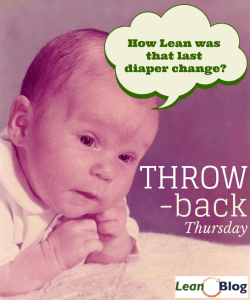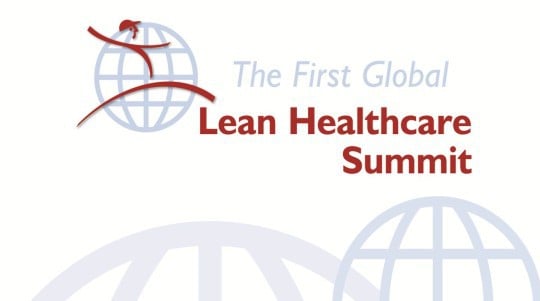 Back in 2007, I had my first opportunity to travel to England, a country I really love visiting. I had the chance to attend the “First Global Lean Healthcare Summit” that was produced by Dan Jones and the Lean Enterprise Academy. They actually have posted many of the slide decks from the Summit there on the site, but there's no video that I can find. I've embedded some of the decks below and I've also added some of my notes that I took.
Back in 2007, I had my first opportunity to travel to England, a country I really love visiting. I had the chance to attend the “First Global Lean Healthcare Summit” that was produced by Dan Jones and the Lean Enterprise Academy. They actually have posted many of the slide decks from the Summit there on the site, but there's no video that I can find. I've embedded some of the decks below and I've also added some of my notes that I took.
From the archive page:
“The event sold out with 320 people (over half from hospitals) attending from 147 organizations from the UK, Ireland, Denmark, Norway, Sweden, Netherlands, Belgium, Germany, Italy, Spain, Turkey, Poland, Switzerland, France, USA, Canada, Brazil, India, South Africa, Singapore, Australia and New Zealand.”
I found some of my notes and quotes from the Summit, which I'll share below.
Dan Jones kicked things off. A few thoughts of his:
- “Lean is about managing processes to create value rather than managing activities.”
- Also a management system based on the scientific method
- The only way to learn how lean really works is to conduct experiments (PDCA)
- Standardization is NOT EQUAL to “command and control”
David Ben-Tovin, the CEO of Flinders Hospital from Australia said:
- Their ER was the worst in their state (“we were killing people”), now clearly the best (even with 50% increase in work)
- “We were really good at blaming each other”
- Care is safer and cheaper now (after four years of Lean)
- We “learned we tolerated bad quality” (compared to a local box manufacturer!)
- Methodology of Lean = “becoming a learning and problem solving organization”
David Fillingham, CEO of Bolton Hospital in England said:
- “CEO's tend to be positive and upbeat people” and sometimes over-optimistic about how things are actually working
- Everyone had a picture of a “fantasy patient journey” – wasn't true, reality had lots of WASTE
- 1 in 10 patients suffer event that could cause harm, 40% of staff saw harmful error in past month
- With Lean:
- 1) processes are purposefully designed and managed (not adhoc)
- 2) Smooth flow of patient staff info
- 3) Layout that supports flow
- 4) Evidence based medicine
- 5) Everyone a problem solver — Have put 525 staff through Rapid Improvement Events (Kaizen Events), 85 events
- “Good quality costs less!”
- Some results:
- Cataract capacity up 30%
- Trauma mortality down 36%
- Length of Stay down 33%
- “We're part factory, part hotel.” (need good processes and good experiences)
- Used the David Mann book Creating a Lean Culture with Pathology
- “We are failing our patients, staff, and funders, not because of bad people, but because of bad processes.”
John Shook presented (via video, if I remember, because he had a flight problem)… it was my first time hearing him, so I learned a ton:
- Manager's job in a TPS context:
- Get each person to take initiative and solve problems to improve their job
- Ensure each person's job is aligned to provide value for the customer and prosperity for the company
- “Getting people to think and take initiative is the key!”
- People should be “comforted and supported by the system”
- “Lead the organization as if you have no power” (Ken Higashi told Gary Convis this as he was learning to lead at Toyota/NUMMI)
- At Toyota, responsibility not equal to authority
- Not “top down” or “bottom up” (a conundrum)
- Processes are well-defined and responsibilities are clear
- We move from debate about “authority” (territory) to dialogue about “doing the right thing”
- Telling people exactly what to do takes away their responsibility (if something doesn't work, it's then your fault as the directive leader)
- Leaders expect results, but results come from the process
- The manager's job is to develop people
- Problem solving steps
- 1) Go See
- 2) Ask Why
- 3) Show respect for all people in the system (customers and employees)
- Lean is about “making mistakes and learning from them”
Jim Womack also presented:
- With Lean, start with the purpose – what's the point?
- Providing value to the customer so that the organization can prosper
- Thinking about process: Who is responsible for the process? Who clarifies its purpose? Who drives improvement
- The improvement group drives it? NO! Should be everybody, everyday
- Problem with lean implementation is not “lack of tools”
- Lack of leadership, or the right type of leadership
- Problems occur when we use lean tools without the lean thinking process
- When doing problem solving, always ask “Is that REALLY the problem?” Always consider alternative solutions
- If you're not fixing problems, with Lean, people will do what you've said only when you're looking
Peter Willats, a partner with McKinsey, has experience primarily in the auto industry. He shared a very personal story about his 2 year-old son who was battling cancer and all of the mistakes the hospital made during his treatment and his frustration in not being able to get answers about WHY these things occurred and how they could have been prevented.
His son got a central line infection in the hospital. Willats had “personally observed 4 different standards and 14 applications of the “standard” method.”
He said we “need to change the mindset that medical error is inevitable.” His son had donated two bags of stem cells to be used after some treatment. After treatment, one of the two bags were broken during thawing.
Willats responded the way an automaker would, sending the hospital (as a supplier) a letter that asked them to answer process-related questions, such as:
- Had this problem occurred before?
- Were the thawing process and procedures documented? If so, where were the procedures stored?
- Had the people working that day been properly trained? If so, where were the training records?
- Who was the vendor of the bag? What was the lot # of the bag? Had the bag been saved for investigative purposes?
He requested a response within seven days and never heard anything back.
Dr. John Toussaint spoke and it was the first time I met him. I embarrassed myself by saying something about ThedaCare being in Minnesota instead of Wisconsin. Ooops. I'm sure John doesn't remember that.
- Lean requires “courage” to ask “why do we do it that way?”
- 3.5 hours of wasted time per 8 hour shift for an RN is now down to 1 hour, via 5S
- When employees go through 2 or more Rapid Improvement Events, that leads to statistically significant higher employee satisfaction (not just ONE event, but two or more)
- 3% of their workforce is dedicated full time to improvement efforts through redeployment
Jim Womack wrapped things up by saying:
- “If this lean stuff seems easy, you're probably not doing it.”
- Point kaizens are “good, but not sufficient”
- We need “small batch metrics” – frequent metrics, not monthly averages
- “Not too many people are killed by defective cars anymore… fixing this in healthcare is a moral obligation.”
- When really doing lean:
- “Every day is hard, but life is good” (Toyota saying)
Time for the 2015 LEI/ThedaCare Summit
This year's Summit is being held June 3-4 in Dallas, Texas, my home state! This is always a fantastic event and one that I'm proud to be a part of each year. Again, I'm moderating the CEO panel discussion, which has three CEOs from the U.S. and Canada participating this year.
I'm also teaching a daylong pre-Summit workshop on June 2 about Healthcare Kaizen – how to create and sustain a culture of continuous improvement that works toward the ideal of everybody improving everywhere, every day.
I hope you'll join us, as I really do think this is a best Lean healthcare conference each year. Learn more about the agenda, speakers, and logistics.
Please scroll down (or click) to post a comment. Connect with me on LinkedIn.
Let’s build a culture of continuous improvement and psychological safety—together. If you're a leader aiming for lasting change (not just more projects), I help organizations:
- Engage people at all levels in sustainable improvement
- Shift from fear of mistakes to learning from them
- Apply Lean thinking in practical, people-centered ways
Interested in coaching or a keynote talk? Let’s talk.
Join me for a Lean Healthcare Accelerator Trip to Japan! Learn More












[…] As I’ve learned from Lean, and people like John Shook, is that Lean is neither top-down and it’s not completely “bottom-up” either. It’s a blended model. I first heard John say this in 2007 at a Lean Healthcare conference in England (read more about it): […]
Comments are closed.